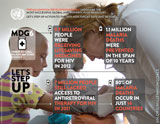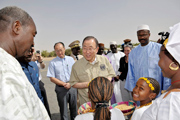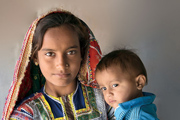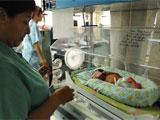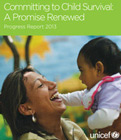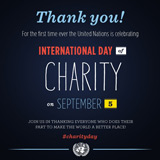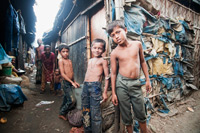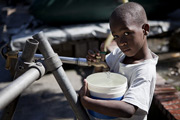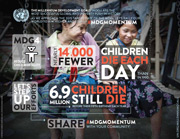News on Millennium Development Goals
2013 Archive
New initiative to improve food security in Zimbabwe
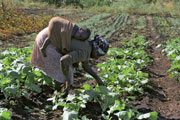
The United Nations Food and Agriculture Organization (FAO) and the United Kingdom are teaming up for an innovative new programme in Zimbabwe that will enable poor farming households to improve food security, nutrition and income while strengthening their long-term resilience.
International Human Solidarity Day
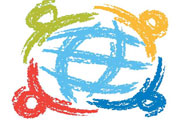
“We all have a role in overcoming today’s economic, political, environmental and social challenges, and we must all share the costs and benefits of sustainable development according to needs and ability,” Secretary-General Ban Ki-moon said in his message for International Solidarity Day, observed annually on 20 December.
This year’s theme is ‘Bridging the gaps to reach the Millennium Development Goals’.
World Malaria Report 2013
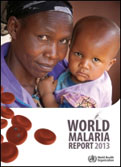
Global efforts to control and eliminate malaria have saved an estimated 3.3 million lives since 2000, according to the ‘World Malaria Report 2013’ published by WHO.
But more needs to be done. “The remarkable gains against malaria are still fragile,” says Dr Robert Newman, Director of the WHO Global Malaria Programme.
Achievement of the MDGs for women and girls
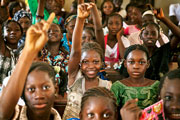
UN Photo/Marco Dormino
Increasing women’s participation at all levels is vital to achieving the MDGs. “Together we must protect hard won gains and make further progress,” UN Women’s Executive Director said at a recent stakeholder's forum on gender equality and the MDGs.
Supporting the Global Fund to Fight AIDS
Global partners recently committed $12 billion to the UN-backed fund to fight AIDS, Tuberculosis and Malaria.
“Financing committed now will straddle the 2015 deadline for achieving the Millennium Development Goals, sending a clear signal that we will do everything possible to reach our targets,” Secretary-General Ban Ki-moon said.
Creating a sustainable food future
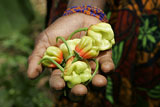
A new report by the UN and its partners finds that the world will need 70 per cent more food in order to feed a global population of 9.6 billion people in 2050.
The report, entitled “World Resources Report: Creating a Sustainable Food Future,” offers “menu items” for improving the way people produce and consume food.
AIDS by the numbers
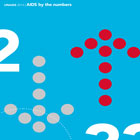
The world continues making progress towards the goal of ending the AIDS epidemic, according to a new report by the Joint United Nations Programme on HIV/AIDS (UNAIDS). In some regions however, many people have inadequate access to essential HIV services. World AIDS Day will be observed on 1 December.
Time for Action
“By working together and investing in governance, security, resilience and opportunity for women and young people, we can help the Sahel move from fragility to sustainability,” Secretary-General Ban Ki-moon said in his visit to the Sahel region with leaders from the World Bank, African Union, African Development Bank and the EU. Global leaders have pledged over $8 billion to boost economic growth.
State of World Population 2013
Every day in developing countries, 20,000 girls below age 18 give birth, according to a new report issued by the UN Population Fund, (UNFPA). Adolescent pregnancy directly impacts health, education, employment and a girl’s rights.
International Day for the Eradication of Poverty
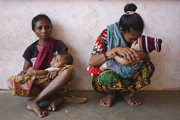
Observances of the International Day for the Eradication of Poverty at United Nations Headquarters, and around the world focused on finding ways to end the discrimination that people face because of poverty.
World Food Day
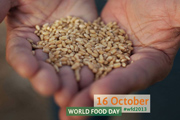
Every day, more than 840 million people go hungry in a world. Each year, the international community observes World Food Day on 16 October to help mobilize action and raise awareness on food security issues.
The theme for this year’s World Food Day is “Sustainable Food Systems for Food Security and Nutrition.”
UNGA Adopts MDG Special Event Outcome
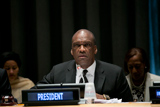
H.E. John W. Ashe, President of the
68th session of the General Assembly
The UN General Assembly on 9 October adopted the outcome of the Special Event to Follow-Up Efforts towards Achieving the Millennium Development Goals (MDGs). Across all acceleration efforts, Member States agreed to scale-up action on the MDGs that are most off-track and to sustain efforts where there is great progress.
MDGs hunger target within reach
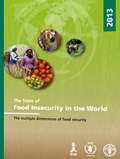
The ‘State of Food Insecurity in the World 2013’ notes that developing regions as a whole have registered significant progress towards the MDG 1 hunger target.
The number of hungry people in the world is now 842 million, down from 868 million reported a year ago.
Delivering the global education promise
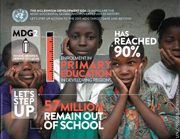
One year after the launch of the Secretary-General’s Global Education First Initiative, dignitaries, activists and education leaders celebrated the remarkable progress made towards increasing education access and discussed ways to ensure full delivery of the global education promise.
Speakers included Secretary-General Ban Ki-moon, World BankGroup President Jim Yong Kim, Desmond Tutu and Malala Yousafzai.
Scaling up action for the Millennium Development Goals
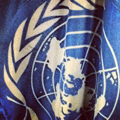
At a Special Event on the Millennium Development Goals (MDGs) hosted by the President of the UN General Assembly, world leaders agreed to scale up action against extreme poverty, hunger and disease and called for a 2015 Summit to adopt the next set of Goals to focus continued efforts after the target date for the MDGs. Learn more.
UN mobilizes innovative partnerships to achieve global anti-poverty goals
At his high-level event on the MDGs, United Nations Secretary-General Ban Ki-moon galvanized Heads of State, business leaders and philanthropists into joint action against extreme poverty, hunger and disease.
Commitments to boost MDG achievement were announced today, bringing the total to $2.5 billion in new commitments ahead of the 2015 target date for the Goals.
MDG Gap Task Force Report 2013
To accelerate progress on the Millennium Development Goals (MDGs), the MDG Gap Task Force Report 2013 stresses that the international community must recommit to increasing aid and reaching a consensus on a development-oriented multilateral trade agreement.
.
Committing to Child Survival: A Promise Renewed
The annual number of under-five deaths fell from an estimated 12.6 million in 1990 to approximately 6.6 million in 2012, according to a new report from UNICEF.
The report urges the global community to take immediate action to accelerate progress in reducing the rate of under-five mortality by two-thirds by 2015.
First-ever International Day of Charity
Recognizing the role of charity in alleviating poverty, the United Nations marks the first-ever International Day of Charity at UN Headquarters in New York.
“At a time when we aim to accelerate our efforts to achieve the Millennium Development Goals and define a bold agenda for the period beyond 2015, the role of charity can and should grow,” the Secretary-General said.
Accelerating progress for the MDGs and post-2015
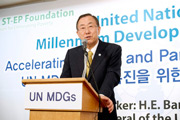
Secretary-General Ban Ki-moon addressed the diplomatic corps in the Republic of Korea about the need to accelerate progress with the Millennium Development Goals (MDGs) and also highlighted the UN’s efforts to facilitate an inclusive post-2015 development agenda.
“When we succeed in saving lives and supporting countries through the MDGs, we give credibility and momentum to the post-2015 process,” the Secretary-General said.
A Life of Dignity for All
On 25 September, the President of the 68th session of the General Assembly will host a Special Event on the MDGs, during a week of high-level events at UN Headquarters in New York. At the event, Secretary-General Ban Ki-moon will present to UN Member States his new report on MDG acceleration and the post-2015 development agenda – “A Life of Dignity for All”.
“Ours is the first generation with the resources and know-how to end extreme poverty and put our planet on a sustainable course before it is too late”, says the Secretary-General, in the report.
Progress on Sanitation and Water for All
Countries have made notable progress in scaling up community-based approaches to improving sanitation, according to a new report launched by the Sanitation and Water for All partnership. The report also identifies areas where more can be done in improving the effectiveness and sustainability of service delivery.
“Our challenge now is to maintain momentum and eliminate barriers to delivering the remaining commitments,” Deputy Secretary-General Jan Eliasson said in a statement.
International Youth Day focuses on youth migration
Highlighting the many risks and opportunities of young migrants and their diversity is the main focus of this year’s International Youth Day, which was celebrated at UN Headquarters and around the world on 12 August.
“It is important to emphasize the positive contribution young migrants make to societies of origin, transit and destination – economically and by enriching the social and cultural fabric,” UN Secretary-General Ban Ki-moon said in his message. Follow Youth Day activities.
UN engages in global dialogue with youth
Ahead of International Youth Day on 12 August, United Nations Secretary-General Ban Ki-moon and UN officials heard concerns from young people in a live interactive video dialogue with youth delegates from across the world.
“The message is clear. You want more and better job opportunities, a good education, access to affordable quality health care, responsive and honest governments, and increased efforts to tackle climate change,” the Secretary-General said in his address to over 700 youth. Watch the interactive discussion!
‘Malala Day’ aims to boost access to education worldwide
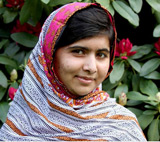
© A World at School 2013
Malala Yousafzai, the young Pakistani champion for universal education and girls’ rights, made her first high level public appearance at the United Nations on 12 July. At the heart of “Malala Day” is a call to improve the lives of some 57 million out of school children by improving education access by 2015. The Day also celebrated Malala’s 16th birthday.
Join the call to support the Global Education First Initiative by posting photos, Vine & Instragram videos using the hashtag #MalalaDay and sign-up online to say you stand with Malala. View photos and video from Malala Day.
More targets within reach -- MDGs Report 2013
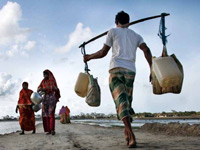
The new Millennium Development Goals (MDGs) Report 2013 shows that the combined actions of national governments, the international community, civil society and the private sector are making the achievement of the MDGs a reality. "The MDGs have proven that focused global development objectives can make a profound difference," UN Secretary-General Ban Ki-moon said.
Learn how the MDGs are the most successful global anti-poverty push in history and help share #MDGmomentum.
38 countries meet MDG hunger target early
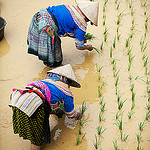
Chalking up successes ahead of the 2015 deadline for the Millennium Development Goals (MDGs), 38 countries have met internationally-established targets in the fight against hunger.
The Food and Agriculture Organization’s Director-General José Graziano da Silva made the announcement at a press conference in Rome.
“These countries are leading the way to a better future,” he said. “They are proof that with strong political will, coordination and cooperation, it is possible to achieve rapid and lasting reductions in hunger.”
Building support for global learning

According to a new paper from the United Nations Education, Scientific and Cultural Organization (UNESCO), progress in reducing the number of out-of school children is slowing down.
Data from the UNESCO Institute for Statistics (UIS) and the Education for All (EFA) Global Monitoring Report shows there were still 57 million children out of school in 2011, a drop of only 2 million from the previous year.
To tackle challenges to global learning, a high-level discussion will take place in New York on 11 June in support of the United Nations Secretary-General’s Global Education First Initiative (GEFI). GEFI aims to raise the political profile of education, strengthen the global movement to achieve quality education and generate additional and sufficient funding through sustained advocacy efforts.
UN joins global leaders in new compact to eliminate malnutrition
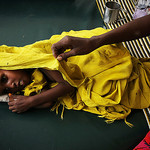
United Nations Secretary-General Ban Ki-moon, world leaders, businesses, as well as civil society organizations joined forces to support the "Global Nutrition for Growth" compact, making concrete commitments to improve world nutrition. According to the document, "Addressing nutrition is of critical importance for achieving the MDGs, in particular the MDGs related to hunger, child and maternal health, and education."
The compact offers concrete actions supporting better nutrition globally over the next seven years. Donors secured new commitments of up to $4.15 billion to tackle under-nutrition up to 2020.
In a video message to the event, the United Nations Secretary-General said, "These commitments can support children’s development, help hundreds of millions of people and boost the economies of some of the world’s most vulnerable countries. The UN system and I will do everything within our power to see them fulfilled."
World Environment Day: Tackling global food waste

Senior United Nations officials urged everyone to play their part in decreasing food loss and waste for World Environment Day (WED), celebrated 5 June. “We live in a world of plenty, where food production outstrips demand, yet 870 million people are undernourished and childhood stunting is a silent pandemic. To create the future we want, we must correct this inequity,” the Secretary-General said in his message for the Day.
To help reduce food waste, the United Nations Environment Programme (UNEP), the UN Food and Agricultural Organization (FAO) and public and private sector partners have launched the “Think.Eat.Save: Reduce Your Foodprint” campaign to raise global awareness and showcase everyday solutions that everyone can practice.
Complementing World Environment Day, UNEP and partners released a new report that highlights how investment in smallholder farmers can play a greater role in food security and can help lift over one billion people out of poverty.
The State of Food and Agriculture 2013
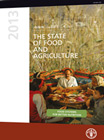
The UN Food and Agriculture Organization (FAO) released a new report entitled, The State of Food and Agriculture 2013: food systems for better nutrition. New findings indicate that 12.5 per cent of the world’s population is undernourished in terms of energy intake.
According to the study, “The traditional role of agriculture in producing food and generating income is fundamental, but agriculture and the entire food system – from inputs and production, through processing, storage, transport and retailing, to consumption – can contribute much more to the eradication of malnutrition.”
Supporting pathways for development in Africa
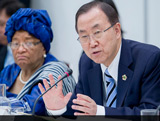
United Nations Secretary-General Ban Ki-moon and senior UN officials recently participated in the Fifth Tokyo International Conference on African Development (TICAD V), in Yokohama, Japan. In his opening remarks, the Secretary-General said, “We are committed to helping Africa realize the Millennium Development Goals, (MDGs). We will make sure Africa’s priorities are fully reflected in our post-2015 development agenda.”
UN officials engaged in a thematic session at TICAD V on the development of a post-2015 development agenda to succeed the eight MDG anti-poverty targets. At a separate event on malaria, the Secretary-General called for additional funding for the Roll Back Malaria Partnership and the UN-backed Global Fund to Fight AIDS, Tuberculosis and Malaria.
The head of the UN Development Programme (UNDP) moderated a panel at the Tokyo Conference to identify priority actions for closing gender equality gaps in Africa and ensuring that gender equality is central to the post-2015 development agenda.
A New Global Partnership
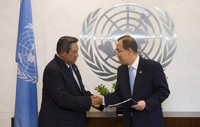
Secretary-General Ban Ki-moon (right)
receives the report from High-Level Panel
co-Chair President Susilo Bambang
Yudhoyono of Indonesia. Photo credit:
UN Photo/Mark Garten
A New Global Partnership: Eradicate Poverty and Transform Economies through Sustainable Development containing new and far-reaching proposals for completely ending extreme poverty by 2030 was released 30 May by the independent High-Level Panel of 27 eminent persons appointed by Secretary-General Ban Ki-moon and chaired by President Susilo Bambang Yudhoyono of Indonesia, President Ellen Johnson Sirleaf of Liberia and Prime Minister David Cameron of the United Kingdom.
The report calls for an ambitious and universal agenda that builds on the successes of the MDGs and promotes sustainable development, good governance, human rights and building institutions. Mr. Ban told the General Assembly, “We are at the beginning of an historic journey.” Read the UN News Centre’s story.
Africa making great strides toward many MDG targets: UN report
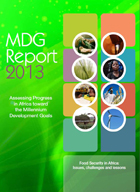
Photo credit: Bridget
Ejegwa/UNDP
Converting Africa’s impressive economic performance over the past decade into greater gains on the Millennium Development Goals remains a primary challenge for Africa, according to the recently launched MDG Report 2013: Assessing progress in Africa toward the Millennium Development Goals.
The report was prepared by the African Union Commission, United Nations Economic Commission for Africa, UNDP and the African Development Bank Group.
While Africa is the world’s second fastest growing region, its poverty reduction rate is still not on track to halve extreme poverty by 2015.
The report says that a concerted effort to improve agriculture, food distribution and nutrition would fast-track MDG progress.
UN urges efforts to achieve ‘water secure world’ on International Day for Biological Diversity
Unless greater efforts are made to reverse current trends, the world will run out of freshwater, United Nations Secretary-General Ban Ki-moon said in his message marking the Day. “As the international community strives to accelerate its efforts to achieve the Millennium Development Goals and define a post-2015 agenda, including a set of goals for sustainable development, water and biodiversity are important streams in the discussion,” he said.
At a press conference at Headquarters, Braulio de Souza Dias, Executive Secretary of the Convention on Biological Diversity, stressed the role that natural ecosystems can play in providing clean, safe water at low cost. Find out more at the UN News Centre.
MDGs-health targets make gains
The World Health Statistics 2013 report cites progress in reducing child and maternal deaths, improving nutrition and reducing deaths and illness from HIV infection, tuberculosis and malaria.
“Intensive efforts to achieve the MDGs have clearly improved health for people all over the world,” says Dr. Margaret Chan, Director-General of the World Health Organization, (WHO). “However, the situation is far from satisfactory as progress is uneven and large gaps persist between and within countries,” adds the Director-General.
World Health Statistics 2013 contains WHO’s annual compilation of health-related data for its 194 Member States, and includes a summary of the progress made towards achieving the health-related Millennium Development Goals (MDGs) and associated targets.
WHO and UNICEF call for progress on sanitation
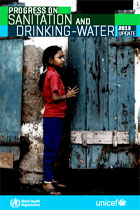
Some 2.4 billion people will remain without access to improved sanitation in 2015 but faster progress on sanitation is possible, according to a joint WHO/UNICEF report. “There is an urgent need to ensure all the necessary pieces are in place – political commitment, funding, leadership – so the world can accelerate progress and reach the Millennium Development Goal (MDG) sanitation target” said Dr. Maria Neira, WHO Director for Public Health and Environment.
Among the key findings from the latest 2011 data, the report highlights that almost two-thirds of the world’s population had access to improved sanitation facilities, an increase of almost 1.9 billion people since 1990. The MDG drinking water target had been met and surpassed by 2010.
The report complements the call to action by United Nations Deputy Secretary-General Jan Eliasson for the world community to increase investment in proper sanitation and end open defecation by 2025.
Taking action for ‘Every Woman, Every Child’
Spearheaded by United Nations Secretary-General Ban Ki-moon, the Every Woman Every Child (EWEC) effort aims to save the lives of 16 million women and children by 2015.
EWEC has brought together over 200 partners and secured new funding for women’s and children’s health. With less than 1000 days until the 2015 target of the Millennium Development Goals (MDGs), initiatives such as EWEC play a key role in building partnerships to accelerate achievements for improving maternal and child health.
The UN Foundation, JP Morgan and the MDG Health Alliance organized a 'Taking Action' summit in New York on 7 May to spotlight the key role the private sector can play in improving maternal health.
On 8 May, as part of the Global Mom Relay in support of the EWEC, Arianna Huffington, Jennifer Lopez and others participated in Mom+Social to connect moms everywhere through the power of social media. Get involved today!
Midwives contribute to progress on health-related MDGs

Sapa, Viet Nam. UN Photo/Kibae Park.
The United Nations Population Fund (UNFPA) and the International Confederation of Midwives (ICM) urged nations to work together to address the inequalities and inaccessibility of midwifery services. According to UNFPA, midwives save the lives of some 300,000 women each year and 10 times as many infants.
In a joint statement for the International Day of the Midwife, UNFPA and ICM stated, “The tireless work of midwives is also a crucial step towards achieving the Millennium Development Goals (MDGs) 4 and 5, targets A and B, by 2015 and beyond.” 5 May marked the International Day of the Midwife.
Glimmers of hope

Herat, Afghanistan. UN Photo/
Eric Kanalstein
World Bank analysis from the Global Monitoring Report 2013 reveals that twenty fragile and conflict-affected states have recently met one or more targets under the Millennium Development Goals (MDGs). The greatest progress has been on gender parity in education. The analysis also finds that eight fragile and conflict affected states have met the goal to halve extreme poverty and six fragile and conflict-affected countries have met the target on improved access to water.
World Bank Group President Jim Yong Kim said, “While these successes offer hope, the reality is that far too many fragile and conflict-affected countries lag behind the rest of the world. We need to offer timely and critical support to improve the lives of people living in these fragile countries.”
Asia-Pacific launch of Zero Hunger Challenge
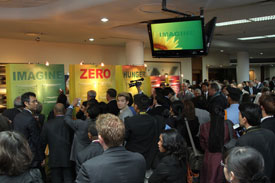
Photo Credit: UN ESCAP
The United Nations Economic and Social Commission for Asia and the Pacific (ESCAP) launched the Zero Hunger Challenge in the region on 29 April in Bangkok. “The attainment of the Millennium Development Goal on poverty and hunger in this region during the remaining 1,000 days in a big push is the first step to eliminating hunger,” Deputy Secretary-General Jan Eliasson said.
“Sustainable development and inclusive growth will not happen on empty stomachs,” said Noeleen Heyzer, Under-Secretary-General and ESCAP’s Executive Secretary.
The Challenge, launched by the Secretary-General at Rio+20, has five objectives concerning food access, stunting, sustainability, productivity and waste.
Invest in the Future: World Malaria Day
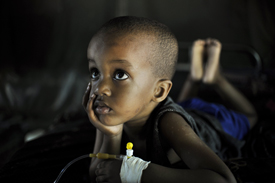
Mohammed, suffering from malaria, recovers at a
Burundian run clinic in Somalia's capital, Mogadishu.
Every year, there are about 660,000 malaria deaths globally, 91 per cent of which are in Africa, according to the World Health Organization![]() .
.
“Controlling malaria does more than improve human health. It boosts social well-being and economic development,” the Secretary-General said in his World Malaria Day message.
To help galvanize efforts for fighting the disease, on 25 April United Nations offices and partners around the world will hold special events, exhibits and film screenings to observe World Malaria Day.
“Invest in the future: defeat malaria” is the theme partners chose for the next three years to call attention to the big push needed to achieve the 2015 Millennium Development Goals and defeat malaria in the future.
The Roll Back Malaria map of activities worldwide shows many ways people can raise awareness of the preventable disease that kills 1 child every 60 seconds. View a special video for Malaria Day.
Boosting progress on education targets
 Secretary-General Ban Ki-moon announced that talks with the World Bank will focus on education, climate change and sustainable energy, poverty, and the role of development banks.
Secretary-General Ban Ki-moon announced that talks with the World Bank will focus on education, climate change and sustainable energy, poverty, and the role of development banks.
In support of the Secretary-General's Global Education First Initiative (GEFI), a series of events are taking place in Washington, D.C., for the final sprint to achieve the global education targets by 2015. Events will culminate in the Learning for All Ministerial on 18 April at the World Bank, which will be webcast live. The Ministerial meetings will focus on improving access to education and quality of education in eight countries that are home to about one-half of the world’s out-of-school children.
On 19 April, the Secretary-General will engage in a conversation on ending poverty with World Bank Group President Jim Yong Kim. The public is invited to participate in the conversation using #ittakes.
A Matter of Life: Investing in Sanitation
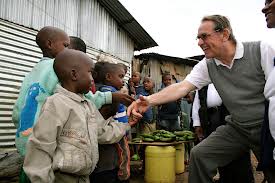 Deputy Secretary-General Jan Eliasson is joining Secretary-General Ban Ki-moon at the 2013 Spring Meetings of the World Bank Group and the International Monetary Fund. The Deputy Secretary-General is expected to highlight the crucial issues of sanitation and the rule of law.
Deputy Secretary-General Jan Eliasson is joining Secretary-General Ban Ki-moon at the 2013 Spring Meetings of the World Bank Group and the International Monetary Fund. The Deputy Secretary-General is expected to highlight the crucial issues of sanitation and the rule of law.
Sanitation remains one of the most off-track Millennium Development Goals, with 2.5 billion people still lacking access, leading to thousands of child deaths every day.
On 19 April at 2 p.m., Deputy Secretary-General Jan Eliasson will join UNICEF Executive Director Anthony Lake, World Bank Group Vice President of Sustainable Development Rachel Kyte, and American Standard Vice President Jim McHale in an interactive online conversation about the economics and politics of sanitation. The event can be followed on Twitter with #wblive.
MDG Momentum: 1000 Days of Action
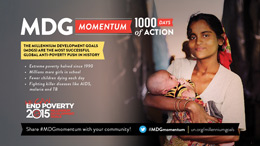 The United Nations and partners worldwide are observing 1,000-days to the 2015 target date for the Millennium Development Goals (MDGs). "We now have less than 1,000 days to close the gaps and accelerate action. That means scaling up success, empowering women and girls, keeping fiscal promises, and mobilizing people from governments to the grassroots," said Secretary-General Ban Ki-moon at a recent MDGs event at the United Nations.
The United Nations and partners worldwide are observing 1,000-days to the 2015 target date for the Millennium Development Goals (MDGs). "We now have less than 1,000 days to close the gaps and accelerate action. That means scaling up success, empowering women and girls, keeping fiscal promises, and mobilizing people from governments to the grassroots," said Secretary-General Ban Ki-moon at a recent MDGs event at the United Nations.
The UN has been working with partners around the world to build momentum and accelerate MDG progress on issues such as proper sanitation, maternal health, education and gender equality. To learn how the MDGs are fighting poverty, please visit the MDG Momentum page and get involved to help build #MDGmomentum worldwide!
World Water Day
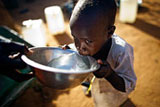 Events are being held worldwide to mark World Water Day (WWD), observed annually on 22 March. In his message for Water Day, United Nations Secretary-General Ban Ki-moon said, “On this World Water Day, I appeal for heightened cooperation. Water is a common resource. Let us use it more intelligently and waste less so all get a fair share.”
Events are being held worldwide to mark World Water Day (WWD), observed annually on 22 March. In his message for Water Day, United Nations Secretary-General Ban Ki-moon said, “On this World Water Day, I appeal for heightened cooperation. Water is a common resource. Let us use it more intelligently and waste less so all get a fair share.”
United Nations Deputy Secretary-General Jan Eliasson also launched a call for urgent global action to help end the crisis of 2.5 billion people without basic sanitation. Over 3,000 children die per day due to health risks associated with poor sanitation and lack of clean water.
WWD is coordinated by UNESCO in collaboration with UNECE and UNDESA on behalf of UN-Water.
2013 Global MDG Conference
 UNDP organized the Global MDG Conference in Bogota, Colombia, 27-28 February, where more than 100 participants from nearly 40 countries exchanged views on how best to accelerate efforts for the MDGs ahead of the 2015 target date. In her opening remarks, UNDP Administrator Helen Clark said, “As countries get closer to reaching the MDG targets, dedicated policies and actions are needed to go the last mile to reach those still excluded.” Conference participants also discussed building an ambitious post-2015 development agenda founded on MDG achievements.
UNDP organized the Global MDG Conference in Bogota, Colombia, 27-28 February, where more than 100 participants from nearly 40 countries exchanged views on how best to accelerate efforts for the MDGs ahead of the 2015 target date. In her opening remarks, UNDP Administrator Helen Clark said, “As countries get closer to reaching the MDG targets, dedicated policies and actions are needed to go the last mile to reach those still excluded.” Conference participants also discussed building an ambitious post-2015 development agenda founded on MDG achievements.
Supporting health-related MDGs

The Secretary-General has tasked his Special Envoy for Malaria, Ray Chambers, with helping build political will and financial support for achieving the health-related Millennium Development Goals (MDGs). The health-related MDGs involve reducing child and maternal mortality, HIV/AIDS, malaria and tuberculosis and other diseases by 2015. Significant progress has been observed over the last decade, however, many countries remain held back by insufficient funding for meeting certain health goals.
International Year of Water Cooperation
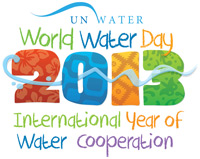 This week, the United Nations launched the International Year of Water Cooperation at the UN Educational, Scientific and Cultural Organization’s (UNESCO) Headquarters in Paris, France. The International Year will raise awareness and facilitate action on water cooperation as it relates to sustainable and economic development, climate change and food security. 22 March will also mark World Water Day. Follow updates on the International Year of Water Cooperation. Watch the United Nations Secretary-General deliver a special message.
This week, the United Nations launched the International Year of Water Cooperation at the UN Educational, Scientific and Cultural Organization’s (UNESCO) Headquarters in Paris, France. The International Year will raise awareness and facilitate action on water cooperation as it relates to sustainable and economic development, climate change and food security. 22 March will also mark World Water Day. Follow updates on the International Year of Water Cooperation. Watch the United Nations Secretary-General deliver a special message.
Promoting people’s empowerment
 The Fifty-First Session of the United Nations Commission on Social Development concluded in New York. The priority theme this year is “Empowerment of people in achieving poverty eradication, social integration and full employment and decent work for all”. The Commission explored experiences, challenges and strategies to promote people's empowerment in the framework of social development. “When people are empowered, they become agents of change,” noted Wu Hongbo, the United Nations Under Secretary-General for Economic and Social Affairs. Follow updates from the Session.
The Fifty-First Session of the United Nations Commission on Social Development concluded in New York. The priority theme this year is “Empowerment of people in achieving poverty eradication, social integration and full employment and decent work for all”. The Commission explored experiences, challenges and strategies to promote people's empowerment in the framework of social development. “When people are empowered, they become agents of change,” noted Wu Hongbo, the United Nations Under Secretary-General for Economic and Social Affairs. Follow updates from the Session.
African leaders & governments to speed up reduction of maternal deaths
 At a Special Event on the Campaign for Accelerated Reduction of Maternal Mortality, (CARMMA), African Heads of State pledged new commitments for reducing maternal mortality following a high-level event a day earlier on the need to accelerate progress on child and maternal health targets. The event, attended by United Nations Secretary-General Ban Ki-moon, was organized by the African Union Commission, with the help of the United Nations Population Fund. Read the Secretary-General's remarks.
At a Special Event on the Campaign for Accelerated Reduction of Maternal Mortality, (CARMMA), African Heads of State pledged new commitments for reducing maternal mortality following a high-level event a day earlier on the need to accelerate progress on child and maternal health targets. The event, attended by United Nations Secretary-General Ban Ki-moon, was organized by the African Union Commission, with the help of the United Nations Population Fund. Read the Secretary-General's remarks.
Secretary-General addresses African Union Summit
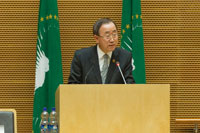 "We have 1,000 days to reach our Millennium Development Goals (MDGs). Now is the time to finish the job by accelerating progress," United Nations Secretary-General Ban Ki-moon said on the margins of the African Union Summit. Important successes have been observed in education and health targets, however, millions remain affected by poverty. In his address to Heads of State and Governments at the summit, the Secretary-General noted that success with accelerating the MDGs, "will depend on ownership by governments and civil society." Read the Secretary-General's address.
"We have 1,000 days to reach our Millennium Development Goals (MDGs). Now is the time to finish the job by accelerating progress," United Nations Secretary-General Ban Ki-moon said on the margins of the African Union Summit. Important successes have been observed in education and health targets, however, millions remain affected by poverty. In his address to Heads of State and Governments at the summit, the Secretary-General noted that success with accelerating the MDGs, "will depend on ownership by governments and civil society." Read the Secretary-General's address.
Achieving the MDGs in Latin America and the Caribbean
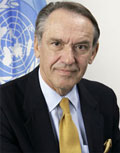 In his address to a summit in Chile, the United Nations Deputy Secretary-General urged regional leaders to apply their tradition of cooperation and partnership towards accelerating progress on the Millennium Development Goals (MDGs).
In his address to a summit in Chile, the United Nations Deputy Secretary-General urged regional leaders to apply their tradition of cooperation and partnership towards accelerating progress on the Millennium Development Goals (MDGs).
At a separate press conference, UN Deputy Secretary-General Jan Eliasson highlighted that more needs to be done for water and sanitation MDGs targets. 783 million people don’t have access to clean, relatively safe, water and 2.5 billion people don’t have sanitation. "And this is the main reason why more than 3,000 children die every day under the age of five, because of diarrhea, dysentery, dehydration and cholera," Eliasson added. Read his remarks to the European Union-Latin America summit.












